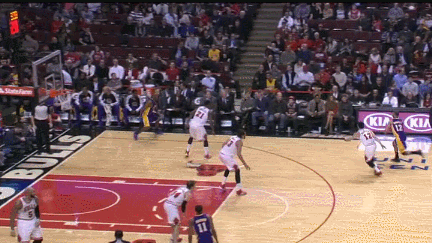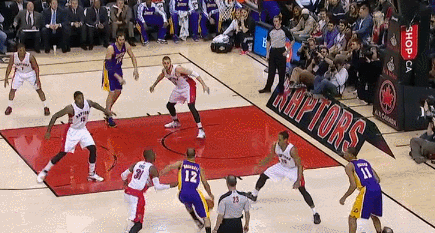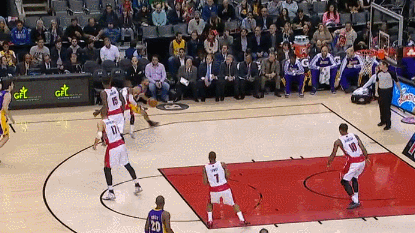How Kendall Marshall has shot himself into an NBA job
Players drafted in the lottery, in draft classes expected to be great no less, aren't supposed to be limited to less than 15 minutes per game in just 48 games for a horrible team as a rookie, let alone need the D-League to prove themselves. They're not supposed to be traded after one season and then waived without a chance to play by the team that acquires him in said trade.
And yet, that is exactly what happened to Kendall Marshall. The UNC product touted as perhaps the best pure point guard in the 2012 Draft went No. 13 to Phoenix, then played just 702 minutes total as a rookie for a 57-loss Suns team, while also spending some time with the Bakersfield Jam of the NBA's D-League. He was traded to Washington as part of the Marcin Gortat deal just before this season tipped off and then waived by the Wizards before another D-League stint (this time with Delaware).
"You can't play on the floor if you can't shoot. There's very few guys. You have to be extraordinary at what you do like a Rondo or somebody and you've got to keep getting better shooting," Mike D'Antoni said before the Lakers took on the Raptors in Toronto Sunday afternoon. That quote goes a long way in explaining why Marshall, who shot 37 percent from the field as a rookie, struggled to fit in at the NBA level last season.
Through 14 games with the Lakers this season since being signed as a free agent in December, however, Marshall is shooting over 44 percent from the field, a stunning 46.4 percent from three-point territory on four attempts per game and has a comfortably above average .562 True Shooting Percentage.
"You know it's funny, we don't think he can shoot but he makes shots. So why we don't think that I don't know. But he's done real well," D'Antoni says about Marshall's surprising play over the last month. "He's able to keep them a little bit honest and you have to do that. It makes the game a lot easier."
The obvious caveat here is that Marshall's impressive shooting numbers this season have come in a limited sample size of just 446 minutes, but while the numbers he's posting now almost certainly aren't sustainable, there is some evidence to believe Marshall can continue to keep defenses at least 'a little bit honest,' as D'Antoni puts it. He shot over 36 percent from beyond the arc in his two college seasons before his horrible shooting year as an NBA rookie last season, and before he came up to the Lakers, was also shooting 46.3 percent from deep in seven D-League games this year.
When asked about his improved shooting and how that opens things up for him to be a better playmaker, Marshall agrees with his coach. "The way I see it is my offensive game has to be respectable, just so we're not playing four on five on offense. Obviously my main goal is to get other guys open shots, so when they're keeping an eye on me it makes it easier for everyone else."
And if there's one thing Marshall does at near extraordinary levels, it's get his teammates easier shots with his playmaking and passing abilities, as the following plays from Los Angeles' last two games show.
Watch him thread this bounce-pass through three defenders to a backdoor cutting Jodie Meeks:

Now watch him use the dribble-drive penetration to suck in the Raptors' defense before getting Pau Gasol a couple of open layups/dunks and Meeks an open three:



As you can see, Marshall has great court vision and superb passing instincts in terms of knowing how long to hold the ball to both draw extra defenders and convince big men that he's going to shoot it before delivering a pass at precisely the right moment.
That vision, passing ability and instinct has seen the 22-year-old average 9.1 assists in about 32 minutes per game since joining the Lakers on December 21, tied with Stephen Curry for fourth in the NBA over that span. In addition, a Lakers offense that ranks 22nd and one that scores just 92.5 points per 100 possessions without Marshall on the floor this season has scored 106.4 points per 100 possessions with the young point guard running things, a mark that would rank eighth in the Association just behind Oklahoma City's offensive rating of 106.5.
The question on offense, in addition to whether Marshall can continue to shoot at a respectable clip, is how he'll fare when teams start to play him tighter and throw pressure at him in the event that his shot does continue to fall. As Marshall himself admits, "I'm being left open a lot. But I didn't play that much last year so I feel like this is really my first time with teams seeing me." Marshall isn't exactly the quickest point guard, and he has run into trouble when opposing guards pressure him since he can't always beat them off the dribble.
Another knock on Marshall is that he isn't a good defender, but plenty of NBA point guards are net-negatives on defense nowadays, and if he can continue to get his teammates open, high percentage looks while keeping defenses honest with his improved shooting, few will mind.
On the surface, a young point guard who isn't quick, supposedly can't shoot and can't defend doesn't seem like much to be excited about, but as Jose Calderon has shown us, there is room for such limited guards to not only survive in the NBA, but thrive. And before you laugh at that comparison between Marshall and one of the game's premier sharpshooters, consider that Calderon shot 27 percent from three over his first two seasons in the league before making the jump to elite shooter (42.9%) in Year Three. A player compare of Calderon's and Marshall's first 60-65 NBA games reveal some similar per minute numbers and advanced metrics, and remember that Jose was older and had already played some pro ball in Spain at the time. Marshall is 22, with plenty of room to grow provided the opportunity.
With the rash of injuries to Lakers guards and the team's subsequent lack of depth, Marshall should continue to get that opportunity in L.A., as D'Antoni even joked about prior to Sunday's game. "He can have like eight turnovers and not be taken out?" D'Antoni replied to a reporter's question of whether playing without having to look over his shoulder to the bench has helped Marshall. "Yeah it helps, that helps," the coach said with a chuckle.
For the record, Marshall's assist-to-turnover ratio of 2.91 is solid, so if he was going to reduce himself to a benching, being careless with the ball probably wouldn't be the reason why. Still, D'Antoni's point is understood.
Nevertheless, such opportunity has given Marshall a chance to prove himself as an improved shooter and a potentially elite playmaker over the last month after a year in NBA limbo. Whether he ends up with a long term starting job at such a star-heavy position remains to be seen, as does whether he can even sustain this level of play for much longer than a month or whether he'll shoot himself out of an NBA job as quickly as he's shot himself into one.
But for right now, Kendall Marshall has established himself at least as an NBA caliber point guard on some level. Considering where he was just a month ago, that's a pretty good start.
(GIFs courtesy NBA.com/stats footage, Stats courtesy media.nba.com/Stats and Basketball Reference)
HEADLINES
- Celtics' Brown 'grateful' to receive MVP endorsement from LeBron
- LeBron becomes 1st player with 43K regular-season points
- Brown, Pritchard lead Celtics' thrashing of Lakers
- Shorthanded Thunder hit 21 3-pointers to end Cavs' 7-game win streak
- LeBron, Riley ponder what might've been if Heat partnership lasted longer